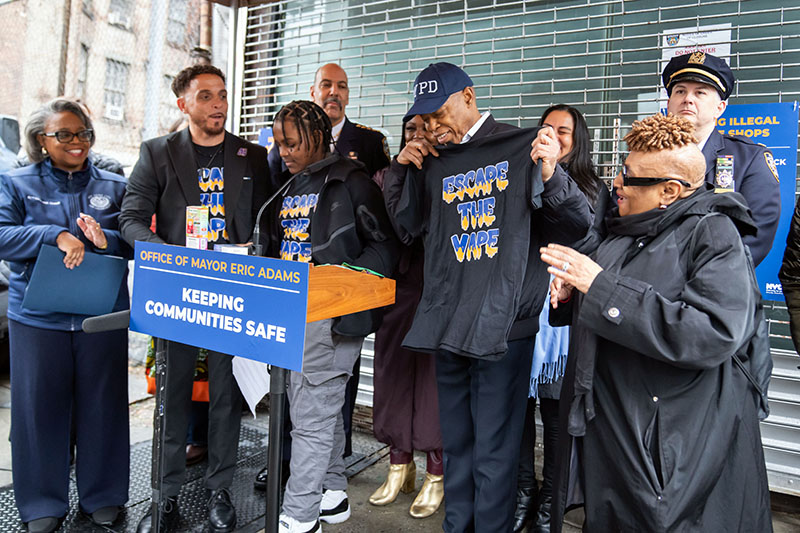NEWYORK: New York City Mayor Eric Adams and New York City Corporation Counsel Muriel Goode-Trufant announced that the city of New York has filed a federal lawsuit against nine of the largest nationwide distributors of disposable e-cigarettes, popularly known as “vapes” — the most popular devices for nicotine use among middle and high school youth.
The defendants — all of whom have close relationships with e-cigarette manufacturers in China — are alleged to be distributing e-cigarettes with such youth-attracting flavors as pink lemonade, watermelon, banana ice, lychee ice, and cool mint to sub-distributors in the city that then supply them to retail stores or sell them directly to consumers in New York City and around the country through online sales, violating nearly every applicable federal, New York state, and New York City law governing the sale of e-cigarettes.
The lawsuit seeks to block these so-called “master distributors” from further sales of these illegal items into New York City, seeks both monetary damages and penalties, and marks the continuing effort by the Adams administration to curb illegal sales of flavored e-cigarettes, which are appealing and addictive, especially to teens.
“Nicotine addiction among middle and high school youth is exploding — fueled in large part to the targeting of our children. Today’s lawsuit not only builds on our previous two lawsuits against distributors and wholesalers, but makes clear that we will do whatever it takes to keep our children safe and enforce the law when it comes to illegal vape sales,” said Mayor Adams.
“Building on the resounding success of ‘Operation Padlock to Protect’ and the sealing of more than 1,370 illegal cannabis shops, we are taking every step in our power to stop the flow of harmful products to young New Yorkers. We are also hopeful landlords will now move to get legitimate businesses into their vacant storefronts and look forward to what this next phase will bring for our local economy. Every day, we are working to make New York City the best place on the globe to raise a family, and a key part of that mission is protecting the health of our children, which we continue to do every day.”
“This case builds on the city’s ongoing efforts to hold predatory companies accountable for undermining public health and fueling an epidemic of vaping among youth in our communities,” said Corporation Counsel Goode-Trufant.
“I am proud of the incredible work ‘Operation Padlock to Protect’ has done to rid our communities of the illegal cannabis shops that were plaguing our neighborhoods,” said New York City Sheriff Anthony Miranda.
“This initiative is one of the greatest examples of community and law enforcement at its best, with multiple agencies working together to deliver extremely quick and meaningful results that make New Yorkers safer and healthier. We will continue to enforce the law and ensure that illegal operators are held accountable.”
“It is illegal to sell flavored e-cigarettes in New York City,” said City Hall Chief Counsel Allison Stoddart.
“With this new lawsuit against nine distributors, the Adams administration is continuing to hold companies accountable when they put profits over the health of New Yorkers.”
The defendants in the lawsuit are:
10 Days, Inc. d/b/a Pod Juice: A California corporation with a principal place of business in Agoura Hills, California.
EVO Brands, LLC: A Delaware limited liability company with its principal place of business in Los Angeles, California.
Midwest Goods Inc.: A corporation formed under the laws of the State of Illinois with a principal place of business in Bensenville, Illinois.
MYLÉ VAPE INC.: A New York corporation with a principal place of business in Ridgefield, New Jersey and Jamaica, New York.
MVH I, Inc.: A New York corporation with its principal place of business in Ridgefield, New Jersey.
Puff BAR Inc.: A corporation formed under the laws of the State of California with its principal place of business in Glendale, California.
PVG2, LLC, d/b/a, “Puff Bar”: A Delaware limited liability company with its principal place of business in Los Angeles, California.
Safa Goods LLC: A Florida limited liability company with its principal place of business in Port Charlotte, Florida.
SV3, LLC d/b/a Mi-One Brands: An Arizona limited liability company with its principal place of business in Phoenix, Arizona.
The dangers of e-cigarettes to youth led the US food and drug administration FDA in January 2020 to ban flavored vape products.
Most e-cigarettes provide nicotine levels far exceeding that of conventional cigarettes.
Further, federal health authorities, such as the U.S. Surgeon General and the FDA, say fruit, cola, and dessert-flavored e-cigarettes tempt kids to vape high levels of nicotine. Cartoon character packaging on e-cigarettes and devices that look like toys or include mini-games target youth and have contributed to the epidemic of nicotine addiction among youth.
As cited in today’s lawsuit — filed in the U.S. District Court for the Southern District of New York — the FDA and the Centers for Disease Control and Prevention released data in 2024, showing 14 percent (3.8 million) of middle and high school students reported ever using e-cigarettes, and 3.5 percent (410,000) of middle school and 7.8 percent (1.2 million) of high school students reported using e-cigarettes within the past 30 days.
More than one in four (26.3 percent) of current youth e-cigarette users reported using an e-cigarette product daily. More than one in three (38.4 percent) youth e-cigarette users reported using e-cigarettes in at least 20 of the last 30 days.
The lawsuit alleges that the nine defendants violated the prevent all cigarette trafficking Act, a federal law that effectively bars the sale of any e-cigarettes except in face-to-face transactions.
The city’s case represents an ongoing effort by the Adams administration to ensure compliance with laws that protect public health.



